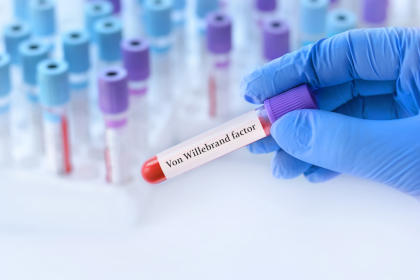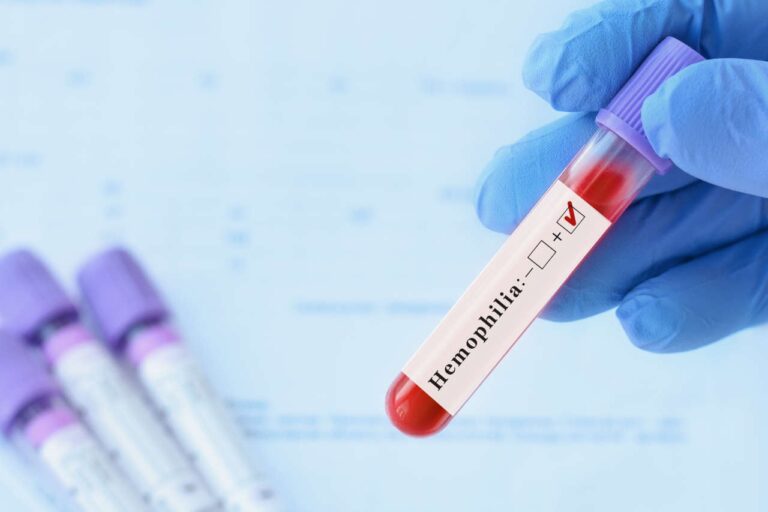
Von Willebrand disease (VWD) and hemophilia are inherited blood disorders. Both disorders make it harder for your blood to clot. While some symptoms may overlap, these conditions aren’t the same. Differences also exist in the way they are diagnosed and treated.
Get Financial Assistance
Von Willebrand Disease vs. Hemophilia: A Quick Overview
Von Willebrand disease (VWD) is the most common inherited bleeding disorder in which the blood doesn’t clot normally. Over 3 million people in the United States live with VWD [1].
VWD happens when the blood is deficient in a clotting protein (clotting factor) called von Willebrand factor. It can also result due to a defective von Willebrand factor.
Hemophilia is also an inherited bleeding disorder in which the affected individual lacks clotting factor VIII or IX, or rarely XI. It is less common than VWD, affecting about 30,000 Americans [2].
Hemophilia primarily affects males, while VWD is as common in males as it is in females.
VWD symptoms tend to be milder than those with hemophilia.
Von Willebrand Disease vs. Hemophilia: Comparing the Symptoms
VWD and hemophilia share several symptoms, including:
- Easy bruising
- Recurring or severe nosebleeds
- Unusual bleeding after a trauma or injury
- Heavy bleeding after minor surgery, dental work, or vaccination
- Heavy or abnormally long menstrual bleeding
Internal bleeding may occur in severe cases, leading to:
- Painful or stiff joints and muscles
- Accumulation of blood under the skin (hematoma)
- Blood in the urine or stool
- Low number of red blood cells (anemia)
People with VWD often report bleeding in the nose, mouth, intestines, uterus, and vagina. On the other hand, hemophilia is more likely to cause bleeding in the joints and within muscles.
What Test Is Used To Differentiate von Willebrand Disease from Hemophilia?
Blood Tests for VWD
- Von Willebrand factor antigen
This test measures blood levels of von Willebrand factor.
- Von Willebrand factor activity
This test helps determine if the von Willebrand factor works properly during the clotting process.
- Factor VIII clotting activity
This measures the level and activity of factor VIII.
- Von Willebrand factor multimer
This helps your healthcare provider determine the type of von Willebrand disease.
Diagnostic Tests for Hemophilia
- Screening tests
These include blood tests that measure how long your blood takes to form a clot.
- Factor assays
Also called clotting factor tests, they measure how well clotting factors VIII and IX work during the clotting process.
Speak to a Specialist
About Copay AssistanceVon Willebrand Disease vs. Hemophilia: Comparing Treatments
Von Willebrand Disease Treatment

Minor bleeds in von Willebrand disease might not require treatment. In such cases, your healthcare provider will ask you to avoid certain medications, such as blood thinners (like aspirin).
Treatment for VWD can vary depending on the type and severity of the symptoms. For milder cases, a medicine called desmopressin acetate is administered, either by injection or a nasal spray.
In more severe cases, you may need injections of lab-created von Willebrand factors. A healthcare provider may consider such injections in milder cases that don’t improve with the desmopressin acetate nasal spray.
Hemophilia Treatment
Hemophilia treatment involves injections of lab-created clotting factors to replace missing factor VIII or IX, depending on the type of hemophilia. Treatment products may include:
- Emicizumab (Hemlibra)
- Desmopressin acetate
- Amicar
- Gene therapy, such as Roctavian and Hemgenix
Von Willebrand Disease vs. Hemophilia: Frequently Asked Questions
Is factor VIII the same as von Willebrand?
No. Though they work closely as a complex (FVIII/VWF), they are different proteins.
Why is it called von Willebrand disease?
The disease is named after Finnish physician Erik Adolf von Willebrand. In 1926, he published a paper describing bleeding disorders in three generations. He also distinguished the condition from hemophilia and other bleeding disorders known at the time.
What are other names for the von Willebrand factor?
Other names for the von Willebrand factor are factor VIII-related antigen and ristocetin cofactor. However, health experts rarely use these names nowadays.
REFERENCES:
- Baxt, J. (2024). Building awareness about Von Willebrand disease. InventUM. https://news.med.miami.edu/building-awareness-about-von-willebrand-disease/
- Hemophilia Federation of America. (2024, June 24). Hemophilia A – Hemophilia Federation of America. https://www.hemophiliafed.org/disease_type/hemophilia-a/













